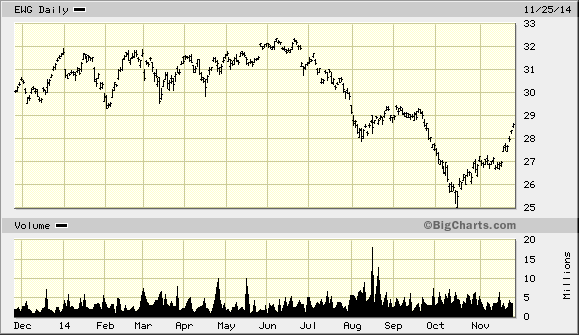On November 17 an important change in the Chinese stock
market will take place which will likely have very important long term
consequences for not only the Chinese stock market but for the global equities
market. Stock Connect will give non Chinese investors access to onshore Chines A Shares and allow mainland Chinese investors access to shares trading ont he Hong Kong exchange.
(Reuters) - A long-awaited trading link
between Hong Kong and Shanghai will launch on Nov. 17, a crucial step towards
opening China's capital markets that will give foreign and Chinese individual
investors unprecedented access to each others' stock exchanges.
The announcement by Hong Kong and Chinese regulators on Monday
comes as China is making a big push to widen the use of the yuan, with Canada
and Malaysia becoming the latest addition to a growing list of trading hubs for
the currency.
The so-called Stock Connect trading scheme could boost the average
daily value of stock trading in Hong Kong by about 38 percent by 2015, French
bank BNP Paribas estimates, and may ultimately lead to the creation of the
world's third largest stock exchange.
The project will at the same time provide a channel for Chinese
savers to start moving some of the $8 trillion of private wealth currently in
deposits into overseas stocks.
The consequence of this change is to give foreign investors more than their
limited access to stocks listed on the Shanghai market (A shares) and Chinese
investors access to shares of Chinese companies traded on the Hong Kong
exchange (H shares which are included in the Hang Seng Index). Many companies
dual list.
The long term impact of
this change is potentially far greater than the near term impact. China’s
“economic footprint” is far larger than it’s representation in global stock
indices and in the portfolios of global investors. That is because of the
limits of accessibility to the Chinese market. A shares have not been included
in the emerging market indices. The stock connect will have important long term
implications as
this analysis in the FT by a Goldman Sachs researcher explains:
The long-term implications for the Chinese
market are tremendous. Foreign ownership of A shares, which stands at less than
5 per cent of free float through the current quota systems, will increase as
these stocks are added to global equity indices.
There will also be changes to fund
allocations, as China is under-represented in global equity benchmarks. It
contributes more than 12 per cent of global GDP and a similar share of world
trade, but has a weighting of just over 2 per cent in the MSCI All Country
World Index. The inclusion of A shares in global equity benchmarks could
trigger as much as $21bn of incremental fund allocations to China by 2016.
In the long term, Stock Connect will
integrate A shares with Hong Kong shares to create the world’s second-largest
market by value. Size aside, it is a market of increased relevance to global
investors who are seeking more exposure to China. The integration of A shares
into global indices will allow investors to capture China’s growth more broadly
and access opportunities that are only available in domestic markets at
present. It will also allow international investors to refine their exposure
from large-cap oil, telecom and banks towards sectors offering more focused
exposure to domestic consumption such as health care and media.
Stock
Connect is a big step forwards in further liberalising China’s A share market,
creating unprecedented opportunities for investors worldwide. It is also an
important component of China’s market reforms including renminbi
internationalisation, which will elevate the country’s standing in the global
economy
A Bloomberg article gives
an idea of the implications of the addition of A shares to the major emerging
markets index
…A-shares could
eventually be a 10 percent weighting in the MSCI Emerging Markets Index,
according to MSCI. The index has $1.4 trillion of assets that use it as a
benchmark. That means over $100 billion worth of demand could come from being
included in that one index, albeit incrementally.
The impact on the MSCI all
world index would be to near double the weighting of China from under 2% to a
bit under 4%
ETFs
and Stock Connect
There are around half a
dozen ETFs that invest in A shares. They have been established in partnership
with Hong Kong brokers who have been permitted to buy A shares (qualified
foreign institutional investors: QFII) An indication of potential interest in
this sector is that over 15 ETFs in this sector are currently under
registration but not listed.The largest and most liquid of these is ASHR
ASHR has traded higher all
year and has gotten a further lift as the stock connect date has approached
moving up 8% in the last 3 months.
But the underlying index still trades at a p/e of 8.9, a significant discount to
the overall emerging markets as well as of course the US. So on both a
valuation basis and the long term prospects of large inflows there may well be
significant long term opportunities in this sector.







